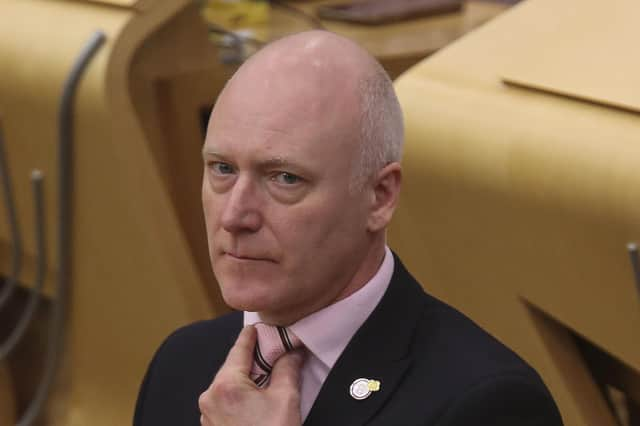Euan McColm: Drug deaths toll entirely due to the SNP’s failed policies


Faced with a startling lack of talent and intellect across the SNP’s parliamentary group, First Minister Nicola Strurgeon has no choice but to implement a “you’ll do” strategy when it comes to filling vital government roles.
On Friday evening, Fitzpatrick announced that, after talks with the FM, he had “agreed” to leave his post. He would no longer do.
It was scarcely surprising that Fitzpatrick had to go. On his watch, drug-related deaths have risen to their highest ever level. In 2019, 1264 people lost their lives to addiction, an increase of 160 per cent since the SNP came to power at Holyrood I’m 2007. This is a situation which must not be allowed to continue.
Advertisement
Hide AdAdvertisement
Hide AdYet the departure of Fitzpatrick from the public health brief is nowhere near a solution. What’s needed is real investment in the problem.
A recent report by academics from the University of the West of Scotland identifies massive real terms cuts in budgets for alcohol and drug services. In 2007, annual funding stood at £114million. Now it is just £53m.
Furthermore, the authors of the report - Iain McPhee and Barry Sheridan - point out that a much trumpeted £20m investment in the Scottish Drugs Death Task Force represented not new money but the partial restoration of funds previously cut.
It used to be perfectly straightforward. Drug addicts - junkies - were victims of their own indulgence. We told kids to “just say no” and treated problem drug use as a lifestyle choice. We are, thank goodness, more sophisticated in our thinking, these days.
We know that addiction is driven by hopelessness, by depression, by fear. We know that a drug addicted adult is liable to have been a damaged child. And we know that this is a complex area requiring careful thought and proper investment.
When the latest drug death figures were published last week, Nicola Sturgeon was at her most sincere. The figures were, she said, completely unacceptable and indefensible. Her government had much to do to sort things out.
The First Minister went on to apologise to families who had been let down and conceded that there were not enough rehab beds available for those who need them.
Sturgeon - and her predecessor Alex Salmond - have left their fingerprints all over this crisis. A politician of the bread and circuses variety, the First Minister is at her most enthusiastic when doling out goodies to voters rather than when faced with real problems. So it’s a big “yay!” to free prescriptions and a mumbled “I’ll get to that” to complex problems.
Advertisement
Hide AdAdvertisement
Hide AdAnd there is a connection here. Every penny spent on freebies for the middle classes - whether it’s the prescriptions policy or the abolition of tuition fees - is a penny that cannot be spent supporting the most vulnerable. This drugs crisis exposes the disconnect between SNP rhetoric and SNP policy.
Naturally, many Scottish nationalists instinctively blame Westminster for the terrible drug death toll. Across social media, there was the usual exhausting complaint that Scotland didn’t have the powers it needed to tackle this problem. Many focused on the fact that UK legislation prevents innovations such as safe rooms where addicts may inject under supervision.
But this was all hooey. The Scottish Government has all the powers it needs to create a proper strategy to tackle this problem. And anyone who think that safe rooms would end these deaths at a stroke is not thinking hard enough about the reasons people become addicts.
That’s not to say that safe rooms are not worthy of consideration. It may be that the Scottish Government should have the right to allow their use. This may be an instance where more powers for Holyrood are appropriate. Scotland has a worse drug deaths record than any other part of the UK and if the solution requires a peculiarly Scottish approach then who would argue against that?
Having disposed of Fitzpatrick, Sturgeon proposes installing Angela Constance as the new minister for drugs policy. “Look!” demands the First Minister, “I am taking action.”
None of this will affect the outcome of May’s Holyrood elections. While the SNP remains the only credible pro-independence party, it will coast to victory.
This, I’m afraid, is not good news for those who want to see the number of drug deaths fall. There is no political imperative, here. Failure will be forgiven by the First Minister’s supporters because the most important thing isn’t saving a few hundred drug addicts, it’s breaking up the United Kingdom.
Over the past 14 years, the SNP has succeeded in wooing a considerable section of middle Scotland. Cautious, small c conservative voters who one would have recoiled at the very thought of backing the nationalists are now confident in doing so.
Advertisement
Hide AdAdvertisement
Hide AdBut in winning the support of enough haves to ensure election victory, the nationalists have increasingly neglected the have nots. They have cut vital local services and made the weak weaker.
Nicola Sturgeon may have promised tough and rapid action but that shouldn’t divert attention from the fact that Scotland’s appalling record on drug deaths is entirely down to the policies of her SNP.